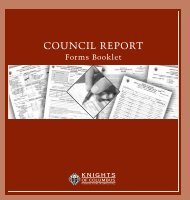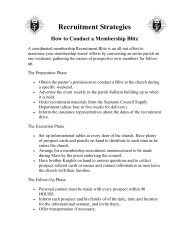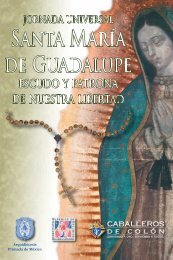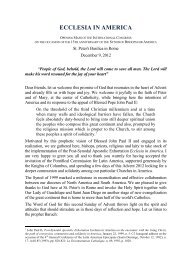Download PDF - Knights of Columbus, Supreme Council
Download PDF - Knights of Columbus, Supreme Council
Download PDF - Knights of Columbus, Supreme Council
You also want an ePaper? Increase the reach of your titles
YUMPU automatically turns print PDFs into web optimized ePapers that Google loves.
for practical deliberation—“what am I to do?” Aquinas’ first set<br />
includes being itself, a good that human persons share with other<br />
entities, and since the being <strong>of</strong> living things is life itself, the basic<br />
human good at this level is that <strong>of</strong> life itself, including bodily life,<br />
health, and bodily integrity. His second set includes the sexual<br />
union <strong>of</strong> man and woman and the handing on and educating <strong>of</strong><br />
human life, a set <strong>of</strong> goods human persons share with other sexually<br />
reproducing species but, <strong>of</strong> course, in a distinctive human way. His<br />
third set includes goods unique to human persons, such as<br />
knowledge <strong>of</strong> the truth, especially truth about God, fellowship and<br />
friendship with other persons in a human community (friendship<br />
and justice, peace), and the good <strong>of</strong> being reasonable in making<br />
choices or what can be called the good <strong>of</strong> practical reasonableness.<br />
The practical principles directing us to these goods are first<br />
principles <strong>of</strong> natural law rooted in the fundamental principle that<br />
good is to be done and pursued and its opposite avoided. 12<br />
The practical principles based on these goods, principles such<br />
as life is a good to be preserved, knowledge <strong>of</strong> the truth is a good to<br />
be pursued, etc. direct us to the goods perfective <strong>of</strong> our being as<br />
persons. But they do not, <strong>of</strong> themselves, help us to discriminate<br />
between possibilities <strong>of</strong> choice and action that are morally good and<br />
morally bad. Indeed, even sinners appeal to these goods and the<br />
principles directing that they be pursued in order to “justify” or,<br />
better, to “rationalize” their immoral choices. Thus a research<br />
scientist who unethically experiments on human persons, lying to<br />
them about the nature <strong>of</strong> the experiments because he realizes that<br />
they would never consent to undergo them if they knew the truth<br />
about them, rationalizes his immoral behavior by appealing to the<br />
good <strong>of</strong> the knowledge to be gained through these experiments and<br />
its potential benefits for the life and health <strong>of</strong> other persons.<br />
If these principles <strong>of</strong> practical reason do not help us determine,<br />
before choice, which alternatives <strong>of</strong> choice are morally good from<br />
- 11 -

















